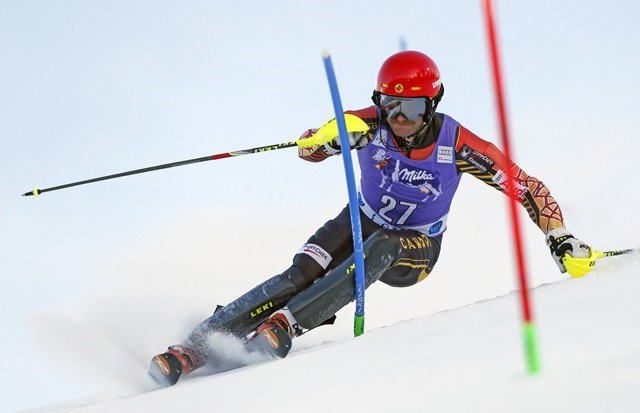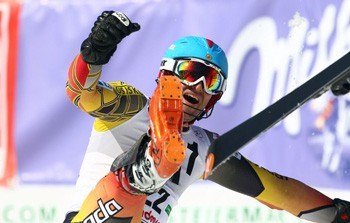
Whistler’s Mike Janyk has always got a lot on his mind, and he’s not shy about sharing it when you give him a chance.
The 31-year-old, who will participate in his third Olympics when he competes in Saturday’s men’s slalom, takes a thinking-man’s approach to ski racing. He’s a guy who focuses a lot of his attention on the mental side of his sport.
In my Pique feature on Janyk this week, the 2009 world championship bronze medallist talked a lot about how some of the struggles he’s faced this season and last have been a result of his mindset on race days. But he said he’s also going into these Games with a clearer head than ever before, free of the overwhelming pressure he felt in the lead-up to the Olympics in his backyard in 2010.
There wasn’t nearly enough space in the paper this week to share all of Janyk’s thoughts from our lengthy sit-down interview while he was home in Whistler for a quick stop before heading over to Europe for final pre-Olympic training. With his race now less than 24 hours away, here are some of the highlights that didn’t make the cut:
[jump]
On being a three-time Olympian without any high expectations:
“That’s wild, if I think back to when I was a kid, and this is what my childhood dream was, to compete in the Olympics for Canada. So without that need for a medal, it’s allowed me to really see how fortunate and how cool this experience is, and how many people I’ve been able to inspire over the years… through being in the Games.
“May (2013) was the first time I ever felt like an Olympian, at the Olympic Excellence Series event in Vancouver, even after competing in two Games. You get caught up in the panic of trying to achieve something and trying to reach goals and you lose sight of what’s actually happened.”
On his season to date, during which his best result was a 14th-place finish at Kitzbühel:
“This year, every race I’ve been basically going in not knowing what I’m going to feel in the start gate, but (think), ‘Let’s take what we get.’ I’ve been questioning myself in the start gate this year, I’ve been frozen in the start gate this year. (At) Kitz, my skiing wasn’t where I’m totally free, but it was a cool place. I had a good fire there, not that ultimate fire, but a good sense.
“Schladming (his next race, where he didn’t qualify for a second run)… I think I wanted it too much after (Kitzbühel) to build on it. I made that mistake at the bottom and would have been in there, around the 20s again, without that mistake, but I know that’s not where I want to be and after Schladming it reminded me what I set out to do a few years ago — to compete out of enjoyment and let the successes come.
“I can only go by what I feel, and I feel ready for a big result, which is so weird to say because I’ve had nothing this year, but I feel in a place totally ready for it.”
On struggling to find speed on race days:
“In training, some days I’m lights out. But when I look back to my best seasons, every day I got on snow I was lights out. We’re training with guys who have been on the podium this year and I’ve beat them by a bunch, so obviously I have the speed when it’s there. For sure, it’s the mental side.
“I know how to ski. It’s all in there. It’s just whether it’s going to come out on that day. It’s also a cool feeling to know it’s in there. I’m not searching to try to find something new or thinking, ‘If I find this boot…’ or ‘If I find this ski…’ or anything like that. It’s in there.
Q: Is having your event on the second-last day of the Olympics a good or bad thing?
“If you get it out of the way early you get to party a little more, like my friends on the luge team. (laughs) I think to compete early, it’s almost like you would rather, just because you would otherwise have to wait. But with that wait, the greater platform you have to capture the attention of more people. The 100 metres is the last event. Hockey is the last event. All these ones that go at the end have a build-up of nerves, and when you wait for something the release is that much greater.
“From a neurotic standpoint, I’d rather go up first, but it’s like a greater gift to go at the end. It feels that way even though it’s tougher on the individual.”
Q: There was no Olympic slalom test event in Sochi. Is is difficult preparing to race at a venue you’ve never been to before?
“Really, there’s nothing to prepare for, so long as you’re open to it. That’s what I’ve accepted, whereas before it was like, ‘Shit, I didn’t get to go there.’ But the decision’s been made, we’re not going in there before. Better get comfortable with that.
“You always give respect to the mountain you’re on and take what comes. But in the moment, every turn on every course is different anyways. It’ll be cool. I’m excited to check it out. We’ll get a couple days to look at it and that’ll be cool too. Sometimes you can over-prep.”
Q: Croatian coach Ante Kostelic will set the second run and is known for plotting some unusual courses. How do you feel about that?
“That’ll be interesting. I’ve done a bunch of his courses and I like his courses. He set first run at Kitzbuhel too. He always sets something funky and maybe he will, but I’m at my best when I don’t prepare and just go in and trust myself. The great thing about his courses is it forces… you to use your instinct. You’ve got to trust yourself.
“He does some weird stuff and pushes the limits of the rules because he trains with (son and former overall World Cup champ) Ivica, but we’ve trained a ton of that over the years with our coaches.”

On being a leader for the first-time Olympians on the Canadian technical team:
“There is a good role to be played there, and that empowers me, too, if I know I can be a calm, steady, grounding aspect for them… If I can help ground them and dial them in for a great performance, then that’s really cool and something that would be really special, too.
“I didn’t really realize that role until a couple days ago and how important that was. I think back to the people who helped me, veterans over the years, and that’ll be something that can ground me as well, I get the residual effect of being that for them.
“Trevor (Philp) and Phil (Brown), they’re both phenomenal athletes, super talented, great heads on their shoulders. Phil’s probably just like I was, so much energy, and Trevor’s pretty chill, but they’re both super fired up for their first Games and they’re going to be the next generation and be super successful. I welcome the chance to help them find their feet.”
Q: How does having an Olympics in the middle of the World Cup schedule impact the season?
“Some guys come out of those Games come out hungry as hell. Other guys who have built up with that as their focus have subsided. The World Cup events after, you generally see guys who haven’t podiumed (get there)… because guys who have won a medal have maybe subsided, or maybe guys came close and feel burned out. It’s different dynamic afterwards.”



